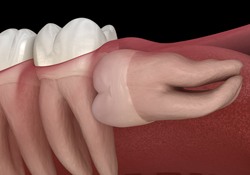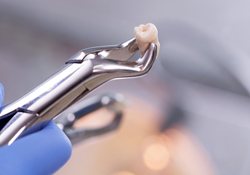


Wisdom teeth, also known as third molars, typically come in around the ages of 17 and 25. While some people can keep these extra teeth without issue, the vast majority of wisdom teeth – about 85% – will need to be removed for health reasons. That’s why Dr. James Kirby is always prepared to perform wisdom teeth extractions in Green Hills.

Wisdom teeth can lead to all sorts of health issues. For one thing, there’s often not enough room for them in the mouth, meaning they can fail to erupt and become impacted; this can be very painful and cause inflammation. If wisdom teeth do erupt, they can crowd the other teeth and cause misalignment, potentially undoing any previous orthodontic work.
Because wisdom teeth are located in the back of the mouth and are in an awkward position, they’re often hard to brush and floss properly, increasing the risk of cavities; they can also render your second molars similarly vulnerable to decay.

At Green Hills Dental Center, we can help you determine whether or not a restorative dental procedure is truly necessary. Dr. Kirby can use X-rays to check their development and predict whether they’ll cause any issues when they erupt. In most cases, an extraction will be recommended if the wisdom teeth are impacted, crowd the mouth, or are otherwise causing discomfort.
You should also be aware of the symptoms of wisdom teeth that aren’t erupting properly. Contact your dentist in Green Hills if you experience any of the following:

During an extraction, anesthesia or another form of sedation dentistry will be used to dull any pain or discomfort. The dentist will make an incision in the gums to expose the tooth for removal; sometimes the tooth can be taken out whole, but in other cases it may be easier to remove in pieces. Afterwards the site will be cleaned of any debris, and gauze will be placed to control the bleeding.
You’ll need to give yourself some time to heal after the procedure; depending on the level of sedation used, you might need someone else to drive you home.
We can give you specific after care instructions after the surgery. In general, you can control any discomfort with pain medication and use an ice pack for the swelling. You’ll need to avoid strenuous activities for a while, and a soft food diet will be required for at least the first 24 hours. In general, it usually takes about three to four days to fully recover from the procedure.

In many cases, wisdom teeth seem to cause nothing but trouble. Lots of people worry about the cost of their extractions, so we’re here to help! During your consultation, we will discuss the financial aspects of your treatment in detail, including your payment options, so you won’t run into any surprises. Until then, here are some things to take into consideration.

The cost of wisdom tooth extraction can vary on multiple different factors. Here are the two that have the biggest influence on the cost:

Wisdom tooth extraction is considered by most dental insurance companies to be a “major procedure.” This means that it generally receives about 50% coverage when deemed to be medically necessary. That being said, every plan is slightly different, so it’s a good idea to confirm this with your provider ahead of time. We would also be happy to help you with this process. At Green Hills Dental Center, we are proud to be in network with Aetna, Assurant, BlueCross BlueShield of Tennessee, Cigna, Delta Dental, MetLife, Nippon, Novanet, Sun Life Financial, Unum, and United Concordia. If you have any questions about your plan, feel free to give us a call!

If you don’t have dental insurance, this doesn’t mean that you will be left completely on your own. By joining our VIP dental membership club, you can receive preventive care as well as 20% off other treatments completed at our practice. We are also happy to accept payments through Lending Club and CareCredit. These third-party financing companies can split the cost of your treatment into manageable monthly installments with little to no interest. To learn more about your financial options, don’t hesitate to contact one of our friendly team members.
It’s unlikely that you will feel any sensations of pain or discomfort during wisdom tooth extractions because your mouth will be numbed with a local anesthetic beforehand. On top of that, our team might even provide you with sedation dentistry to both relax you and further minimize your body’s ability to register discomfort. Generally speaking, the procedure itself should not involve pain. After the surgery, you’ll likely feel sore for several days, but this can be managed easily with our specific aftercare instructions, including taking pain relievers and using a cold compress to reduce swelling.
The treatment timeline will be different for every patient, as no smile is the same as another. In many cases, wisdom tooth removal can take about 15 to 20 minutes for each tooth. If you need to get all four final molars extracted in a single visit, it can take around 90 minutes to complete. Even so, by providing you with local anesthesia and sedation medication, you may expect to feel like barely any time has passed. The timeframe can be affected by factors like your tooth’s location, position, and whether or not it is impacted. Our team will develop a detailed treatment plan during your consultation before giving you an estimate of the amount of time it’ll take to complete your procedure.
In general, the majority of the population has all four wisdom teeth that come out during late adolescence or early adulthood. That said, a portion of people actually don’t have every wisdom tooth, as they might have three, two, or none at all. According to an article from the Dental Research Journal, researchers estimated that 5% to 37% of the population are living without one or more of their final molars. While it isn’t known why some people grow up without all four wisdom teeth, genetics does play a major role. The best way to know if you have all of your wisdom teeth is by taking X-rays.
Our early human ancestors used to consume more raw foods, such as meats, berries, roots, nuts, and leaves. Since they weren’t able to process or even cook their meals, having a strong jaw and plenty of teeth was their best nutritional tool. Chewing was essential for living, so their jaws were much stronger and it was more necessary to have all of their molars. Now that humans consume cooked and softer foods, our jaws have become smaller over time, which often doesn’t leave enough room for wisdom teeth to erupt properly. Since our final molars aren’t essential today and often cause more harm than good, it’s typically recommended that people have them removed if they’re making oral health difficult to maintain.